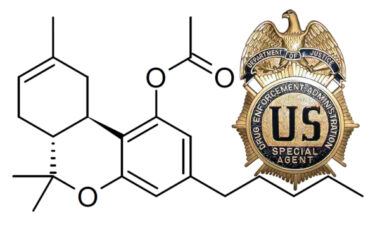 The US Drug Enforcement Administration (DEA) has clarified its position on two synthetic hemp derivatives, confirming that it considers delta-8 THCO and delta-9 THCO illegal.
The US Drug Enforcement Administration (DEA) has clarified its position on two synthetic hemp derivatives, confirming that it considers delta-8 THCO and delta-9 THCO illegal.
Responding to an inquiry by attorney Rod Kight, the agency said that as the two THC acetate ester variants cannot be found in nature, they are to be considered as controlled substances.
“Delta-9-THCO and delta-8-THCO do not occur naturally in the cannabis plant and can only be obtained synthetically, and therefore do not fall under the definition of hemp,” the DEA stated in its reply to Kight. “Delta-9-THCO and delta-8-THCO meet the definition of tetrahydrocannabinols and they are controlled in schedule I.”
Although Kight’s inquiry was about only two specific varieties of THCO acetate, the DEA’s response – while expected – is not good news for retailers in the US who have added THCO-based products to their offer.
“I certainly don’t want anyone to be suffering based on this but from a policy standpoint I think that this is a clear line in the sand from the DEA, and I think it makes a lot of sense,” Kight told CannIntelligence.
Potentially toxic
Long before the DEA’s pronouncement, CannIntelligence had already predicted that THCO acetate would be considered illegal by US federal authorities. “CannIntelligence believes that THCO acetate is a Schedule I controlled substance as a tetrahydrocannabinol that is not exempted under the hemp definition,” we said in 2021 in our regulatory report on Intoxicating hemp products in the US.
According to CannIntelligence’s senior legal analyst Anthony Traurig, author of the report, THCO cannot be considered as hemp even when obtained from hemp-derived THC. “THCO acetate does not fit into the hemp definition because it is neither a hemp cannabinoid nor a hemp isomer,” he said.
In addition, Traurig said, the process used to convert delta-8 and delta-9 THC into THCO, using acetic anhydride, is dangerous and potentially toxic.
Kight said the DEA’s response to his letter did not come as a surprise to him and that he agreed with the legal arguments behind the agency’s conclusions.
“Because the cannabis plant does not produce THCO naturally, it’s difficult to maintain the position that it is actually hemp,” he said – adding that he used to joke with clients about the difficulties it would present to argue in court that THCO was not a controlled substance.
‘I’d be laughed out of court’
“I would tell them: ‘Let’s say that there’s been a criminal charge that you’re selling a synthetic form of THC and I’m supposed to go in front of a judge and argue that this is hemp and the judge, who may not know anything at all about cannabis, listens to me and says ‘OK, so you’re telling me, Mr Kight, that this synthetic chemical the hemp plant does not even produce is actually hemp’. I think I’d be laughed out of court.’ ”
While there have been plenty of studies of how more common intoxicating hemp-derived cannabinoids (IHDCs) are metabolised, little research has so far been released on THCO, and what data is available shows it may be unsafe.
“That was always a concern for me,” Kight added. “I don’t want the hemp industry to suffer as a whole because some people get harmed by this cannabinoid that I don’t even consider to be hemp.”
He said he wrote to the DEA because he was getting “a lot of calls” from businesses in the hemp sector about the legal status of THCO, while also observing a proliferation of THCO-based products in the market.
CannIntelligence research indicates that the US market in IHDCs in the US was worth around $400m in 2022 and it could reasonably increase to over $1bn by 2025. THCO formulations are the fourth most commonly sold, in a list of 50, by retailers marketing IHDCs in the country, following delta-8 THC, CBD and HHC.
A common misunderstanding of the law
While the DEA’s position may make it difficult for cannabis firms to sell THCO-based products in the US, the market in other IHDCs will not necessarily be affected by what some have wrongly interpreted as an indication of the agency’s attitude towards the entire sector.
According to Kight, the DEA drew a clear line between substances that the cannabis plant produces naturally and others that can only be obtained in a lab. “I’ve had a lot of people who have taken this letter and applied it to all intoxicating cannabinoids and that’s not at all what the DEA said. In fact, the DEA said just the opposite,” he said.
Naturally-occuring intoxicating cannabinoids, including delta-8 and delta-10 THC, are not controlled as long they do not contain more than 0.3% delta-9 THC. Although some states have applied the 0.3% threshold to all THC, not many have. The federal government and most states place that limit only on delta-9.
Kight said that the DEA was likely to apply the same logic even to HHC, which can be found occurring naturally in the hemp plant, although not THC-derived. He said that, while THCO is not the dominant product on the market, which therefore won’t be massively affected by the DEA’s clarification, the agency’s letter will shed some light on a previously grey zone affecting all IHDCs.
“This further clarifies what companies can do and so I think, in a lot of respects, this is a helpful letter,” he said.
– Tiziana Cauli CannIntelligence staff







